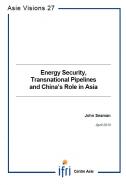Energy Security, Transnational Pipelines and China's Role in Asia

In recent decades, China's transformation from a regional energy supplier to one of the world's largest net energy importers, in particular with regards to oil and gas, has led to an increasing sense of energy insecurity in Chinese policy circles. Guaranteeing adequate supplies of energy to fuel economic growth is a central element in Beijing's efforts to maintain legitimacy in the face of economic reform and transformation. To combat energy insecurity a number of initiatives are being undertaken to diversify energy inputs, suppliers, and the means of their transport.
Among these initiatives are a series of transnational pipeline projects that will transport oil and gas from Eastern Siberia, Central Asia, and Southeast Asia, effectively reducing China's overall reliance on international sea lanes and maritime choke-points, in particular the Strait of Malacca. An analysis of these projects can shed light on how China's energy security policies are playing out on a regional level, how they are complicated and aided by various competing and converging interests of regional actors, and how they are re-shaping traditional regional dependencies. Indeed, more complex interdependencies among suppliers, consumers and transit states in continental Asia are emerging as a consequence of China's growing role as an energy consumer.
In the end, these pipelines help to diversify China's oil and gas suppliers and transport routes, easing its reliance on Middle Eastern oil and maritime transit, but they are by no means an alternative to the latter. China will continue to rely heavily on international oil markets and maritime shipping routes to deliver Middle Eastern oil. Suring up international markets and finding means to cooperate on international maritime security issues are thus and will remain in China's best interest.

Available in:
Regions and themes
ISBN / ISSN
Share
Download the full analysis
This page contains only a summary of our work. If you would like to have access to all the information from our research on the subject, you can download the full version in PDF format.
Energy Security, Transnational Pipelines and China's Role in Asia
Related centers and programs
Discover our other research centers and programsFind out more
Discover all our analysesJapan’s Takaichi Landslide: A New Face of Power
Prime Minister Sanae Takaichi has turned her exceptional popularity into a historic political victory. The snap elections of February 8 delivered an overwhelming majority for the Liberal Democratic Party (LDP), driven by strong support from young voters, drawn to her iconoclastic and dynamic image, and from conservative voters reassured by her vision of national assertiveness. This popularity lays the foundation for an ambitious strategy on both the domestic and international fronts.
The U.S. Policy Toward Taiwan Beyond Donald Trump: Mapping the American Stakeholders of U.S.-Taiwan Relations
Donald Trump’s return to the White House reintroduced acute uncertainty into the security commitment of the United States (U.S.) to Taiwan. Unlike President Joe Biden, who repeatedly stated the determination to defend Taiwan, President Trump refrains from commenting on the hypothetical U.S. response in the context of a cross-Strait crisis.

China’s Strategy Toward Pacific Island countries: Countering Taiwan and Western Influence
Over the past decade, China has deployed a diplomatic strategy toward the Pacific Island Countries (PICs). This strategy pursues two main objectives: countering Taiwan's diplomatic influence in the region and countering the influence of liberal democracies in what Beijing refers to as the "Global South."

Opening up the G7 to South Korea to Address Contemporary Global Challenges
The G7’s global influence has diminished as powers like China reshape international governance through initiatives such as BRICS and the Shanghai Cooperation Organisation (SCO). With the G7 now representing just 10 per cent of the world’s population and 28 per cent of global GDP, its relevance is increasingly questioned.










